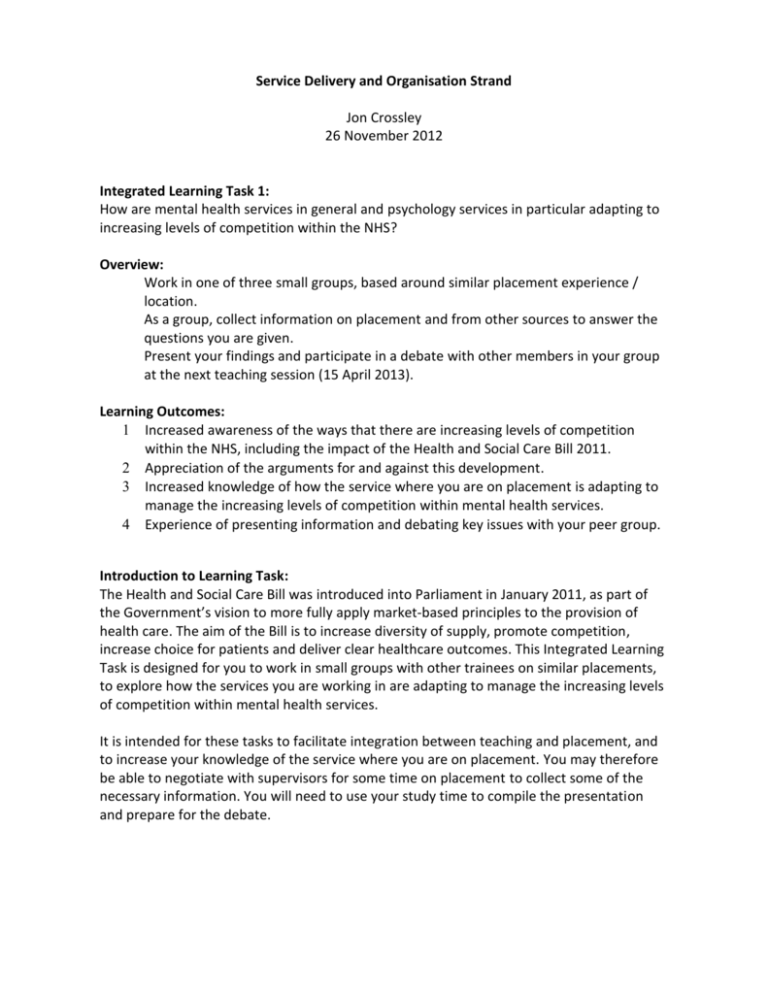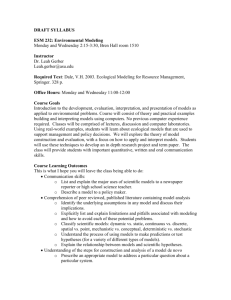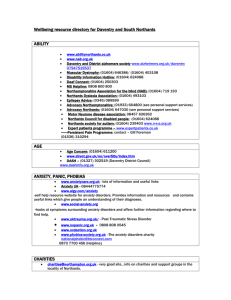Service Delivery Integrated Learning Task 1
advertisement

Service Delivery and Organisation Strand Jon Crossley 26 November 2012 Integrated Learning Task 1: How are mental health services in general and psychology services in particular adapting to increasing levels of competition within the NHS? Overview: Work in one of three small groups, based around similar placement experience / location. As a group, collect information on placement and from other sources to answer the questions you are given. Present your findings and participate in a debate with other members in your group at the next teaching session (15 April 2013). Learning Outcomes: Increased awareness of the ways that there are increasing levels of competition within the NHS, including the impact of the Health and Social Care Bill 2011. Appreciation of the arguments for and against this development. Increased knowledge of how the service where you are on placement is adapting to manage the increasing levels of competition within mental health services. Experience of presenting information and debating key issues with your peer group. Introduction to Learning Task: The Health and Social Care Bill was introduced into Parliament in January 2011, as part of the Government’s vision to more fully apply market-based principles to the provision of health care. The aim of the Bill is to increase diversity of supply, promote competition, increase choice for patients and deliver clear healthcare outcomes. This Integrated Learning Task is designed for you to work in small groups with other trainees on similar placements, to explore how the services you are working in are adapting to manage the increasing levels of competition within mental health services. It is intended for these tasks to facilitate integration between teaching and placement, and to increase your knowledge of the service where you are on placement. You may therefore be able to negotiate with supervisors for some time on placement to collect some of the necessary information. You will need to use your study time to compile the presentation and prepare for the debate. Small Group 1) Nicol, Danielle, Emma, Alice Services Wellbeing Service / IAPT, CMHT Population Adults in Northants 2) Louise, Lisa, Catherine, Tim Medical Psychology Adults in Leics 3) Megan, Colm, Noreen, Hannah, Mandy, CMHT (Adult & OA), Homeless, Inpatient care Adults & Older Adults in Leics & Northants Presentation: As a small group (excluding the two members who will debate), you will present your findings to your cohort at the next SDO teaching day on 15 April 2013. SURG, staff and supervisors will also be invited to attend. You will have to decide as a small group who will present and who will take part in the debate, and how you will delegate the workload. Titles of the presentations: - Group 1 – The role of psychological therapists and other non-psychologists in the provision of psychological care within adult mental health services in general, and in Northants in particular - Group 2 – The role of independent providers / organisations in the delivery of healthcare within mental health services in general, and in Leicestershire in particular - Group 3 – The implementation of the competitive tendering and contracting process within mental health services at the current time, and in Northants / Leicestershire in particular Your group’s presentation should use powerpoint and should last for a maximum of 25 minutes. There will then be 10 minutes for questions. It may be helpful to include brief personal reflections in your presentation, for example regarding your learning from the task or obstacles that you encountered. The presentations are not formally marked, but are viewed as part of the formative assessment on the course. You will receive informal feedback on your presentation and presentation style via a peer review process. All trainees, members of SURG, staff and supervisors present will be asked to provide anonymous feedback on the content and delivery of each of the presentations. Completed forms will only be viewed by the speakers and should be used to develop your presentation skills further. Debate: Following the presentations, two members of the group will debate against each other regarding the issue that the group has presented on. The proposer and opposer will both have 7 minutes to present their arguments, with the proposer presenting first. After both speakers have presented their arguments, there will 10 minutes for questions and wider discussion. Within debates the emphasis is generally on analytical skills, engagement of the audience and strength of argument. The debate will not be formally marked, but is viewed as part of the formative assessment of the course. Titles of the debates: - Group 1 - ‘This house believes that the psychological care within adult mental health services in Northants (Wellbeing Service, CMHT) should be delivered by psychological therapists rather than clinical psychologists.’ - Group 2 - ‘This house believes that the psychological care within medical services in Leicestershire should be delivered by independent provider(s) rather than the Leicestershire Partnership Trust Medical Psychology Service.’ - Group 3 - ‘This house believes that there should be a competitive tendering process regarding the delivery of all adult and older adult mental health services in Northants and Leicestershire.’








